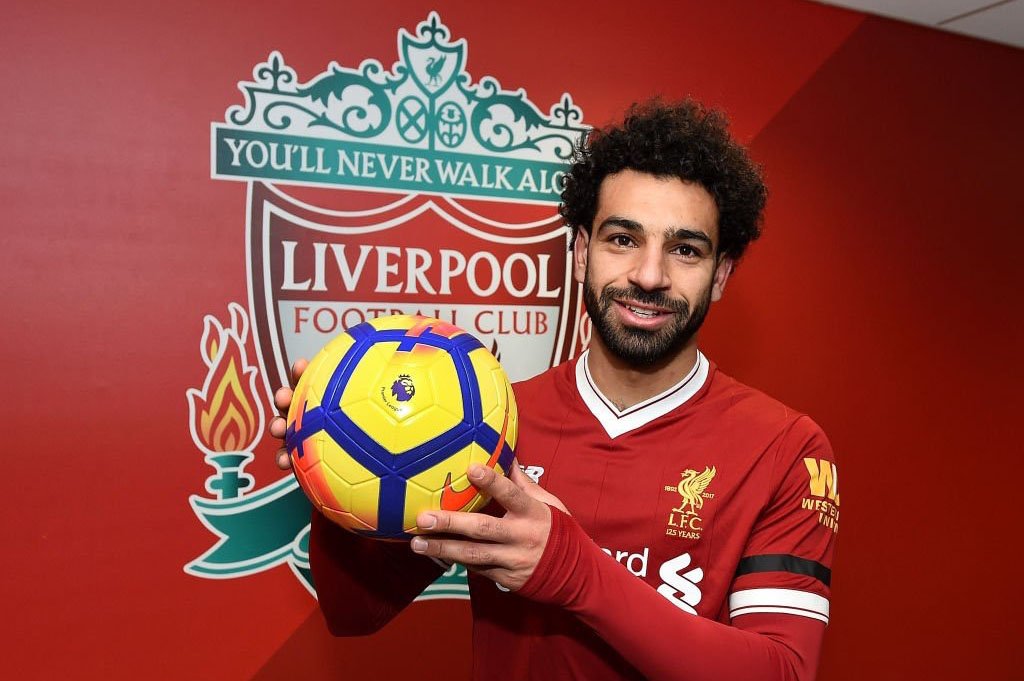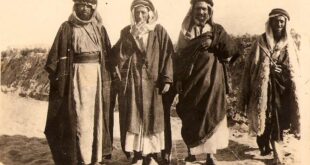While a post-Brexit United Kingdom continues to struggle with xenophobia and anxieties about the Arab/Muslim diaspora, a new hero has emerged in the country’s most popular sport. He’s wildly talented, he’s from Egypt, and he’s Muslim.
Known as “The Pharaoh”, “The Egyptian King”, and even the “Egyptian Messi”, 25-year-old Mohamed Salah is certainly the pride of his native Egypt. But now, as the Premier League’s highest scorer, he has been impossible to ignore not just in Britain, but on the international stage.
While Salah gained recognition early in his career[1], his debut season with Liverpool this year has been nothing short of sensational[2]; so much so that Liverpool fans are fully embracing the Arab-Muslim player. This despite a political climate in the UK that has sparked tense debates surrounding immigration and national identity, and increasing aggression towards Muslims.
Fans in Liverpool aren’t shy about singing the praises of a Muslim footballer. So pleased with his performance, they even express their willingness to convert in jest. One of the most popular chants goes: “Mo Salah-la la la la la/If he’s good enough for you, he’s good enough for me/If he scores another few, then I’ll be Muslim too,” and continues, “Sitting in a mosque, that’s where I wanna be.”
Another song adapted for Salah starts, “Mohamed Salah/A gift from Allah/He came from Egypt to Liverpool/He’s always scoring/It’s almost boring/So please don’t take Mohamed away.” Salah has responded warmly on Twitter and recently told Sky Sports, “I am happy to hear [the songs] every game, and feel the love of the fans. I am happy about everything right now.”
Of course, one chant does not dissolve the entire culture of racism in English football. However, the fans are not only acknowledging Salah’s religion, it is the focal point of their calls for support. At the very least, it is undeniable that Salah is changing the way the football community views Arab and Muslim players. Along with other talented Muslim footballers in the Premier League, like Turkish-German Mesut Özil, Algerian Riyad Mahrez, and Senegalese teammate Sadio Mané, Salah may be the catalyst for a cultural shift towards a greater acceptance of Islam and Arabs in British society.
A History of Violence
White nationalist political organizations like the National Front and the British National Party have been vocally opposed to non-white immigration to the UK since the 1960’s. But since 2013, when Prime Minister David Cameron promised a referendum on the UK’s membership in the European Union, right-wing and ultranationalist groups have found a megaphone in the renewed debate surrounding British national identity. Devastating attacks by Islamic extremists throughout Europe and the growing social anxiety about immigration from the Arab world has put Arab and Muslim minorities on the receiving end of much of the violence and hate speech in Britain today.
Independent NGO TellMAMA (Measuring Anti-Muslim Attacks) analyzes anti-Muslim attacks in the UK. Their data shows a clear link between the political atmosphere in the UK and violence against Muslims. Reports have consistently found spikes in anti-Muslim attacks that correspond with political events and terrorist attacks. In the week following the June 23, 2016 EU referendum, anti-Muslim incidences increased 475%. Police data also indicated a 44% rise in hate crimes against Muslims in July 2016 when compared to the previous month. The report describes these as so-called “defensive hate crimes,” in which the “in-group seek to defend their community from outsiders.” A very recent example is the death of Egyptian student Mariam Moustafa who was publically attacked in Nottingham by a group of women, leaving many to question if the murder was racially motivated.
In addition, the Home Office recorded significant spikes in hate crimes following the Westminster Bridge, Manchester Arena, and London Bridge attacks in 2017. Reports of hate crimes in England and Wales have risen consistently each year since 2011 when law enforcement began recording these offenses.
Post-referendum, there was fear that the UK was entering a new era of Islamophobia, exacerbated by the rhetoric of then-candidate Donald Trump and the U.S. presidential elections. Pavel Klymenko, a Development Officer at FARE (an organization that works to combat inequality in European football) explained, “When the general politics in Europe are getting more and more right wing and racist, you can expect to see more racism in football. Look at Donald Trump in the U.S. That convinces people that it’s okay to say things they wouldn’t normally say. We shouldn’t be surprised that this is happening.”
Sport often acts as a reflection of society and, in Britain, football has followed trends seen in the public sphere. The British organization Kick It Out found a sharp rise in reports of discrimination over five consecutive seasons in professional football leagues. At the halfway point of the 2017-2018 season there was a 75% increase over the same time last year. Last season, 54% of reports in the professional league involving fans were related to racism and 21% were faith-based.
British football’s zealous fans are notorious for bad behavior. FARE studied racism during the 2015-2016 and 2016-2017 seasons and found that fans from the United Kingdom were responsible for 34 out of 193 racist incidents, more than any other country.
Fanatical football groups have been a breeding ground for right-wing, ultranationalist organizations. The anti-Islamic group known as the English Defense League (EDL), founded in 2008, was described by Jon Cruddas of The Guardian as a “dangerous cocktail of football hooligans, far-right activists and pub racists.” The BBC reported that several divisions of the organization were run by football supporters in Luton, north London, Bristol, Portsmouth and Southampton, Derby, Cardiff and the West Midland, and that some of the main figures were organized around football clubs throughout the UK.
Besides evidence of institutional racism in the sport, there have been many public incidents among supports at football games. In one incident in 2013 at a match between West Ham and Manchester City, fans physical broke the prayer lines of fellow Muslim supporters that were observing evening prayer yelling “f**king p*kis, go home” and “E…, E…, EDL.” The attack was supposedly provoked by a rumor that West Ham was giving discounted tickets to Muslims.
Another incident in 2014 was caught on camera by the investigative television program Dispatches. Millwall fans chanted “Leicester, Taliban,” “We all hate Pakis,” and “You’re a town full of bombers.” Even though such behavior is clearly prohibited during matches, the guard did not respond when the host reported it, leading to questions about the enforcement of hate speech rules in stadiums.
A few years ago, one Liverpool fan posted pictures of Muslims praying during halftime in an isolated area of the stadium along with several tweets that expressed his disgust at the public display of faith. Now, the top player of that very same club often performs sujood, the Islamic act of prostration, on the field in front of thousands of cheering fans to celebrate his goals.
An Unlikely Hero
While the statistics tell one story, international media coverage of Salah, and the reaction of football fans, has been overwhelmingly positive. Salah’s heated race with English footballer Harry Kane for the Golden Boot (awarded to the top goal scorer in the Premier League) means that each goal carries extra importance, and the British media diligently covers each match. Salah himself is media-shy and is described as humble and hard-working by teammates and coaches. Egyptian football expert Marwan Saeed explained to BBC Sport. "He is a very down to earth, quiet footballer and person. He barely interacts with the media in Egypt or abroad."
Even though he does not publicize it, Salah is well-known for his charity work, including a recent £500,000 donation to a children’s hospital in Cairo. He also frequently visits his hometown of Nagrig, a small village in Upper Egypt, and has made a point of giving back to the community.
In Egypt, Salah is the darling of the football-crazed public; a local success story who has quickly become a star in the world’s most popular sport. Now, after scoring twice against Congo in the World Cup qualifiers, he will lead the Egyptian national team to the World Cup for the first time since 1990. Fans are ecstatic.
Salah began his professional career in Egypt, but moved to Europe at age 20 after signing with the Swiss club Basel. From there he moved to Chelsea, becoming the first Egyptian to sign with the London-based club. However, he struggled to make an impact and eventually moved on to AC Roma. The season-long loan ended with Salah as the club’s top scorer and 2015-16 Player of the Year. He then signed to stay on with the club for £12 million. However, the very next year, Salah signed a deal with Liverpool for a cool £36.9 million (which Roma recently admitted was still a low price).
Salah returned to England a different player, more mature, consistent, and doing what fans love best: scoring. The forward broke the Liverpool record for the player to reach 20 Premier League goals in the shortest time, achieving the incredible feat in just 25 games. It’s no wonder that the unexpected superstar is idolized by football fans worldwide.
Forty years ago, Cyrille Regis, Brendan Batson, and Laurie Cunningham took the field for West Bromwich Albion. It was the first time that an English football club had played three black players in a single game. They weren’t the only black players in the UK at the time, but their talent was undeniable, and because of it, they made history. Regis died recently and he is remembered as a man who changed British football forever; challenging racism and the perception of black men in the UK, and paving the way for future black players.
Salah now finds himself at the center of another of those rare moments when the mood in sports runs counter to the prevailing cultural attitude. And, intentional or not, he is already changing the image of Arabs and Muslims in the UK by inspiring football fans to, literally, change their tune.
 Arab Media & Society The Arab Media Hub
Arab Media & Society The Arab Media Hub





